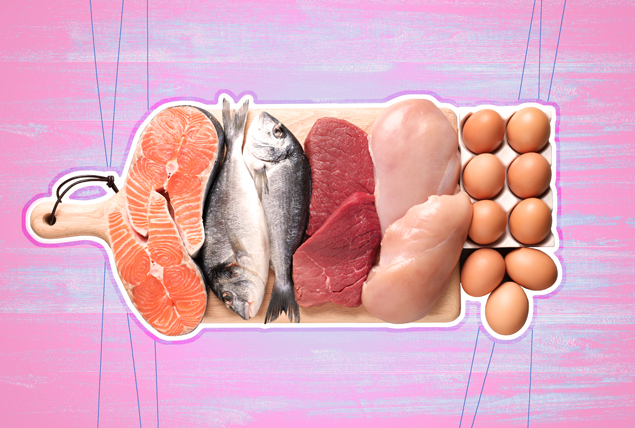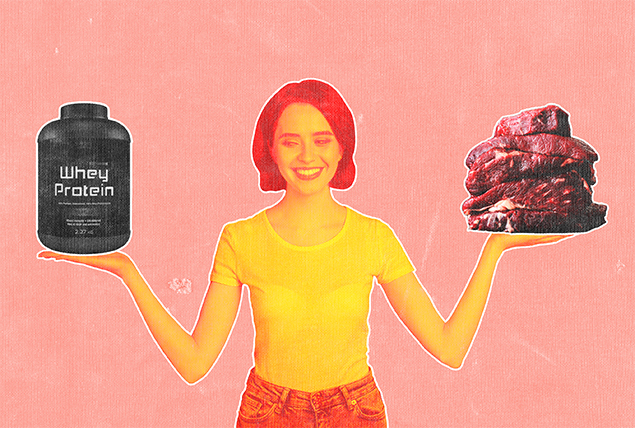Can Too Much Protein Cause Constipation?

Protein is a building block of life and crucial for making gains at the gym, but you can have too much of a good thing.
High-protein diets are in vogue these days and protein is in everything, from chips and candy to water and beer. Proponents tout the macronutrient as an elixir for a better body and sharper mind.
Most of these claims have some truth behind them. Still, consuming too much protein on keto, paleo or any high-protein plan can have potentially severe implications for your sexual and overall health.
How much protein is too much?
"Our body is an efficient minimalist that only utilizes what it needs," said Yelena Wheeler, R.D., M.P.H., a registered dietitian nutritionist in Los Angeles. "If we consume excess protein that the body doesn't need for essential functions—and even for non-essential purposes, such as growing hair and nails—then the body will simply push it out as waste."
Over time, the process of metabolizing and breaking down a high amount of excess protein can strain multiple body parts, including the kidneys, said Catherine Rogers McManus, R.D., Ph.D., a registered dietician and assistant professor in the department of nutrition at Case Western Reserve University in Cleveland.
In general, 1 gram of protein per kilogram (kg) of body weight is an appropriate intake amount for a sedentary man, Wheeler noted.
However, active people may need closer to 1.2 grams per kilogram each day, especially if they're trying to build muscle mass, according to McManus.
The exact threshold for dangerous protein intake varies depending on factors such as age, weight, overall health, activity level and protein source, said David Shusterman, M.D., a urologist at NY Urology in New York City.
Most people don't meet the criteria for excess protein intake and can consume moderately more than the recommended dietary allowance (RDA) without experiencing adverse effects, said Stephanie Griggs, R.N., Ph.D., an assistant professor at the Frances Payne Bolton School of Nursing at Case Western Reserve University.
However, consuming more than 3 grams of protein per kilogram of body weight is considered excessively high, and eating more than 2 grams per kilogram of body weight isn't recommended long-term, experts said.
"It's like any other nutrient in that an excessive intake can be just as harmful as an inadequate intake," McManus said.
What could happen if you consume too much protein?
Let's take a look at eight of the most important questions people have about protein, including the immediate effects of over-consumption and the long-term impacts.
1. Can too much protein cause constipation?
Most high-protein diets encourage replacing carbohydrates with protein, which can diminish fiber intake.
"Many carbohydrate-containing foods—for example, whole-grain bread, pasta, cereals, beans, peas, other legumes and fruits—are good sources of dietary fiber, which helps normalize bowel movements and maintain bowel health," McManus said.
Insufficient fiber can lead to gastrointestinal issues such as constipation and chronic inflammation, which could raise your risk of more severe problems, including colon cancer and inflammatory bowel disease (IBD).
2. Can too much protein cause headaches?
Research from 2002 suggested that consuming too much protein may lead to dehydration. That's likely because the kidneys use fluids to flush out waste products, such as excess nitrogen, that the body breaks down from proteins, according to Cleveland Clinic.
If you don't drink more water to compensate, you may lose more than you take in. Even mild dehydration can cause headaches. Other symptoms include brain fog, fatigue, dizziness and constipation.
3. Can too much protein cause kidney stones?
There doesn't appear to be a link between high-protein diets and kidney damage in healthy people. Eating a high-protein diet can, however, further strain the kidneys of people with preexisting problems, such as kidney disease, according to Shusterman.
That's likely because damaged kidneys have to work harder to filter the waste products of protein metabolism, such as nitrogen.
4. Can too much protein contribute to liver disease?
Like the kidneys, the liver plays a vital role in metabolizing and breaking down anything you eat or drink. When you consume too much protein, carbohydrates, fats or alcohol, the liver has to work harder to convert excess nutrients into waste products such as urea and ammonia.
"Long-term high-protein intake can lead to an accumulation of these waste products, potentially causing liver damage and contributing to the development of liver disease," Shusterman said.
Diets high in carbohydrates and protein can lead to elevated levels of triglycerides, a type of fat, Griggs explained. These are stored in fat cells and can be deposited throughout the body, including in the blood and liver, which can contribute to non-alcoholic fatty liver disease.
Liver disease, particularly in its advanced stages, is closely linked with sexual dysfunctions such as erectile dysfunction (ED), according to a review published in Frontiers in Public Health in January 2023.
5. Can too much protein cause high blood pressure?
Specific high-protein diets have been associated with an increased risk of heart disease, hypertension and blood vessel disorders, said Himesh Gandhi, M.B.B.S., M.S., a urologist at Healing Hands in Pune, India.
That may be because high-protein diets often involve proteins high in saturated fats and "bad" cholesterol—LDL (low-density lipoprotein)—such as full-fat dairy, red meat and processed meats.
Excess fat and cholesterol can cause plaque buildup in the arteries (atherosclerosis), which can raise the risk of heart disease, high blood pressure and stroke. This plaque buildup can reduce blood flow to the penis, which can cause ED, Gandhi added.
6. Can excess protein turn into fat?
Consuming high amounts of protein can help build muscle, but the body can only use so much, McManus said. Any calories that aren't used—regardless of whether they come from protein, fat or carbs—will either be excreted as waste or stored as fat.
High-protein diets that are low in other macronutrients, such as carbohydrates, can lead to imbalances in metabolism and further promote fat storage, according to Shusterman.
A study published in April 2015 indicated that people who replaced carbohydrates with protein were significantly more likely to gain fat than those who swapped fat for protein.
The older you are, the more likely that your body will store extra energy as fat since metabolism slows with age, Wheeler explained. Increased fat, especially around the midsection, can cause several health issues, such as fatigue, insulin resistance and increased cortisol, which can diminish libido.
Being overweight and obese can raise the risk of diabetes, heart disease and stroke and contribute to ED.
7. Can excess protein affect hormone levels?
Shusterman noted that some studies suggest very high-protein diets may reduce testosterone levels and increase cortisol levels.
"One possible explanation for these hormonal changes is the influence of amino acids, the building blocks of proteins, on hormone production and regulation," he said. "However, the effects of high-protein diets on hormone levels can vary among individuals, and more research is needed to understand the mechanisms involved fully."
There's also a direct correlation between overweight and obesity and low testosterone levels, according to Huffman.
These hormonal changes can have significant implications for men's health, including sexual health, and may contribute to ED, diminished fertility and low libido, Shusterman said.
8. Can too much protein raise your risk of cancer?
A potential link between high-protein diets and an increased risk of certain types of cancer was suggested by research published in April 2012. In particular, studies have indicated that diets high in red and/or processed meat contribute to colorectal, prostate and breast cancer, among other issues.
Consuming proteins from plants or other sources, such as eggs and dairy, is potentially linked with a decreased cancer risk, according to Mayo Clinic. Researchers suggest this may be partly due to the hormones, unhealthy fats and carcinogenic compounds in meat.
How can you follow a high-protein diet safely?
Besides sticking to 2 grams of protein or less per kg of body weight, you can avoid the most adverse effects by staying active, drinking plenty of fluids and maintaining a balanced diet with adequate carbohydrates, healthy fats, and essential vitamins and minerals, Wheeler said.
Diversifying your protein sources to include more eggs, fish and plant-based proteins can help, too. High-protein diets in which the predominant protein source is meat—especially red and ultra-processed meats—are much more likely to cause health problems compared to those that are mostly or entirely vegetarian.
"The American Heart Association (AHA) recommends choosing healthy sources of proteins, mostly from plant sources, regularly eating fish or seafood, substituting nonfat and low-fat in place of full-fat dairy, and choosing meats that are lean and unprocessed for ideal cardiovascular health," Griggs said.
This diet is known as the Mediterranean diet, she added. Studies suggest it can be very beneficial, including improving cardiovascular health and body composition.
Examples of nutritious, high-protein, low-calorie foods include the following:
- Chicken breast
- Eggs
- Salmon
- Shrimp
- Tempeh
- Tilapia
- Tofu
- Tuna
- Turkey breast
The bottom line
Most people won't experience serious health issues from eating a higher-than-average amount of protein, but there is a limit to what the body can take.
Speak with your doctor or a registered dietician to find out how much protein—and other nutrients—you need to stay fit and healthy.


















